Lasswell Harold D. The Political Writings of Harold D. Lasswell
Подождите немного. Документ загружается.

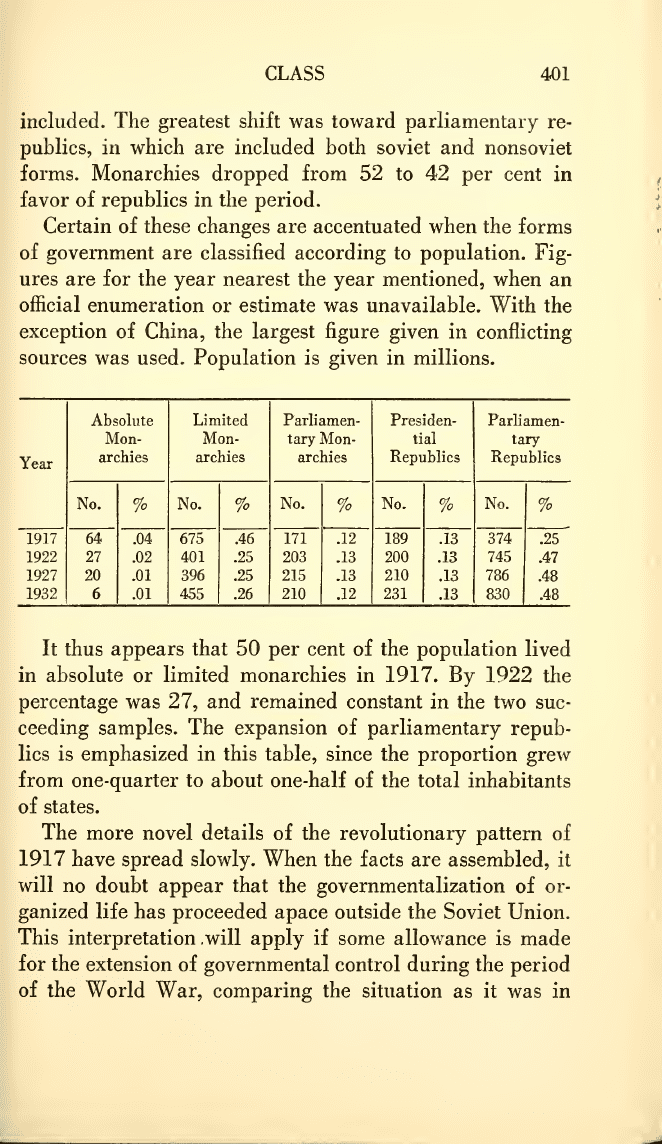
CLASS
401
included.
The greatest shift
was
toward parliamentary
re-
publics,
in
which are included
both soviet and
nonsoviet
forms. Monarchies dropped from 52 to 42 per
cent
in
favor of republics in the period.
Certain of these changes are accentuated when
the
forms
of
government are classified according
to population. Fig-
ures
are for the year nearest
the year mentioned, when
an
official
enumeration
or
estimate
was unavailable. With
the
exception of China,
the
largest figure
given in conflicting
sources
was used.
Population
is
given
in millions.
Absolute
Limited Parliamen- Presiden-
Parliamen-
Mon-
Mon- tary
Mon- tial tary
Year
eirchies archies
archies
Republics
Republics
No.
%
No.
%
No.
%
No.
%
No.
%
1917 64
.04 675 .46
171 .12 189
.13
374
.25
1922 27
.02 401 .25 203 .13 200 .13
745
.47
1927 20 .01 396 .25 215 .13
210
.13
786
.48
1932
6 .01 455 .26 210 .12 231
.13 830
.48
It thus
appears
that 50
per
cent of the population
lived
in absolute or limited monarchies in 1917. By 1922
the
percentage was
27,
and remained constant
in the two suc-
ceeding samples. The
expansion
of parliamentary
repub-
lics is emphasized in this table, since the
proportion grew
from one-quarter to about one-half
of the total inhabitants
of states.
The more novel details
of
the
revolutionary pattern
of
1917 have spread slowly.
When the facts are assembled, it
will
no
doubt
appear that
the governmentalization
of or-
ganized
life has proceeded
apace outside
the
Soviet
Union.
This
interpretation will
apply if some allowance
is made
for the
extension of governmental control during
the period
of
the World War, comparing the situation
as
it
was
in
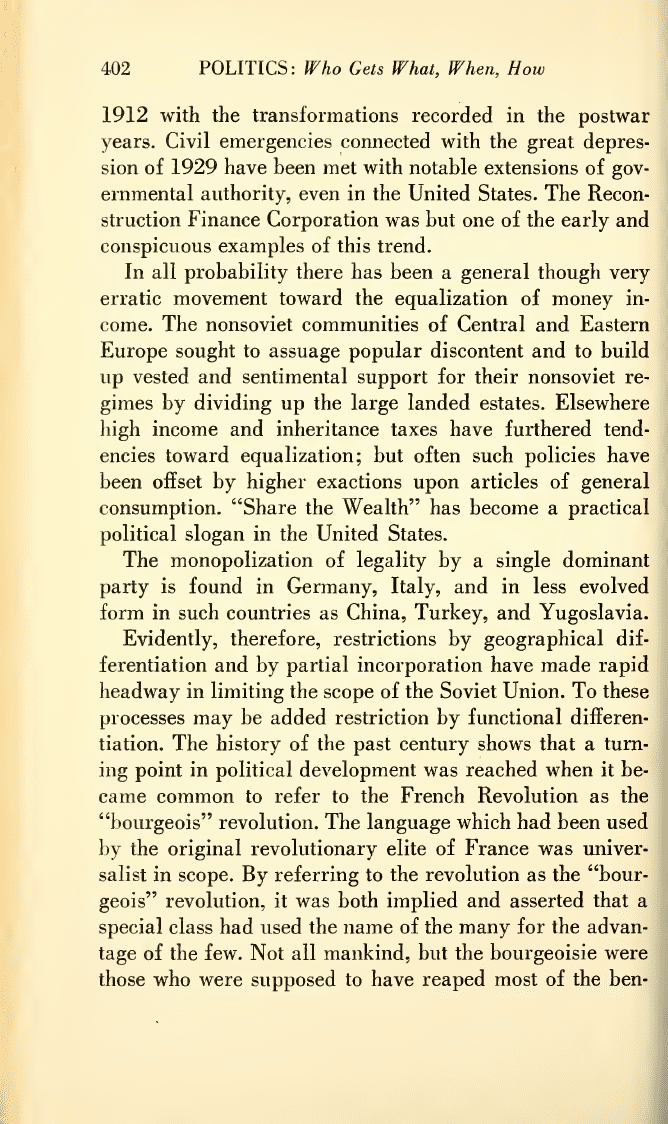
402
POLITICS: Who Gets What, When, How
1912 with the transformations
recorded in the
postwar
years. Civil emergencies
connected with the great
depres-
sion of
1929 have been met with
notable extensions of
gov-
ernmental
authority,
even in the United States.
The Recon-
struction Finance Corporation
was but one of the early
and
conspicuous
examples
of this
trend.
In all probability there has
been a general though very
erratic movement toward
the equalization
of
money in-
come.
The nonsoviet communities
of Central and Eastern
Europe sought to assuage popular discontent
and to build
up vested and sentimental support
for their
nonsoviet
re-
gimes
by dividing up the
large
landed estates. Elsewhere
high income
and
inheritance taxes
have furthered tend-
encies
toward equalization;
but often such
policies
have
been
offset
by
higher exactions
upon
articles
of
general
consumption. "Share the Wealth" has become
a
practical
political slogan in the United States.
The
monopolization
of legality by
a
single dominant
party is found in Germany,
Italy,
and in less evolved
form
in
such countries
as
China, Turkey,
and
Yugoslavia.
Evidently, therefore, restrictions
by
geographical dif-
ferentiation and by partial incorporation
have
made rapid
headway in
limiting
the scope of the Soviet Union. To these
processes may be added restriction by functional
differen-
tiation. The history of
the
past
century shows that
a
turn-
ing
point
in
political
development
was
reached when it be-
came common
to
refer
to
the French Revolution as the
"bourgeois" revolution. The language which had been used
by the original
revolutionary
elite of
France
was
univer-
salist in
scope. By
referring
to
the revolution as the "bour-
geois" revolution, it was both implied and asserted that a
special class had used the name of the
many for the advan-
tage of the
few.
Not all
mankind, but the
bourgeoisie were
those who were
supposed
to have reaped
most
of
the ben-
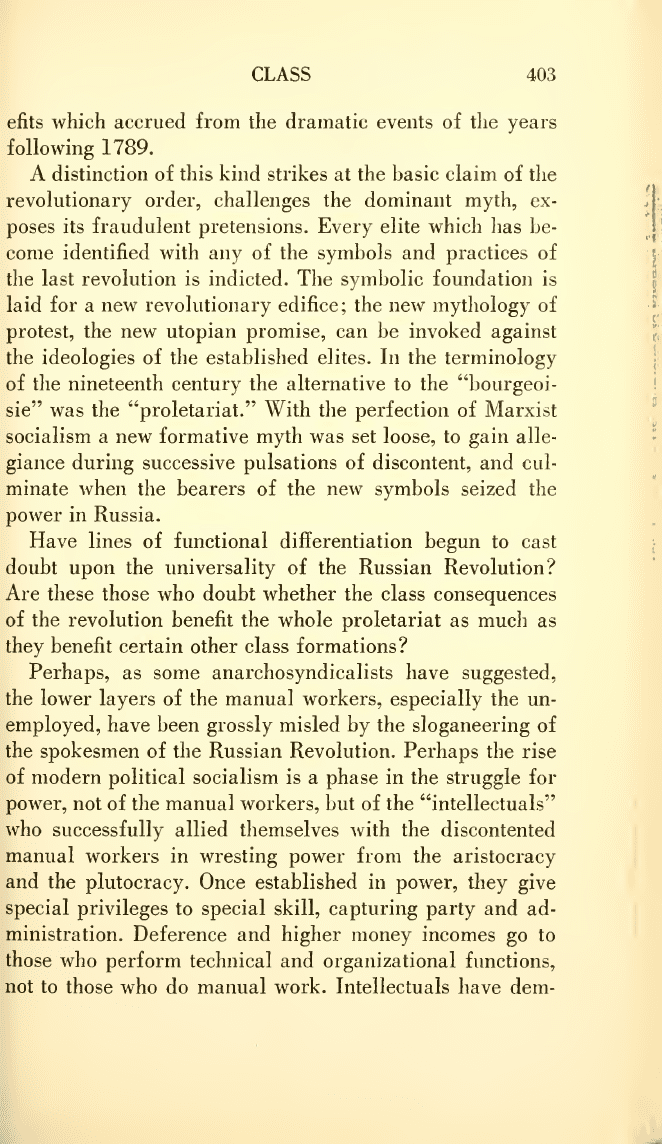
CLASS
403
efits
which accrued from
the
dramatic events of the years
following 1789.
A
distinction of this kind strikes
at
the basic
claim of the
revolutionary order, challenges
the
dominant
myth,
ex-
poses its fraudulent pretensions. Every elite which has
be-
come identified with any of the symbols and practices
of
the
last
revolution is indicted. The symbolic foundation is
laid
for
a
new revolutionary edifice; the
new mythology of
protest, the new Utopian promise, can be invoked
against
the ideologies of the established elites. In the terminology
of the nineteenth century the alternative to the "bourgeoi-
sie" was the "proletariat." With the perfection of Marxist
socialism a new formative myth was set loose, to gain alle-
giance during successive pulsations of discontent, and
cul-
minate when
the
bearers
of the
new
symbols seized the
power in
Russia.
Have lines
of functional
differentiation
begun to cast
doubt
upon the universality
of the Russian Revolution?
Are these
those who doubt
whether
the class consequences
of the revolution benefit the
whole
proletariat
as much as
they benefit certain
other class
formations?
Perhaps, as some anarchosyndicalists
have suggested,
the lower layers of the manual workers, especially
the un-
employed,
have been
grossly
misled by the sloganeering
of
the spokesmen
of
the
Russian
Revolution. Perhaps
the
rise
of modem
political
socialism
is a phase in the struggle for
power,
not of the manual workers,
but of the "intellectuals"
who
successfully allied themselves with the
discontented
manual
workers in
wresting
power from the aristocracy
and the
plutocracy. Once established in power, they
give
special
privileges
to
special skill, capturing party
and
ad-
ministration.
Deference and higher money incomes
go
to
those
who
perform technical and organizational functions,
not to
those
who do manual
work. Intellectuals
have
dem-
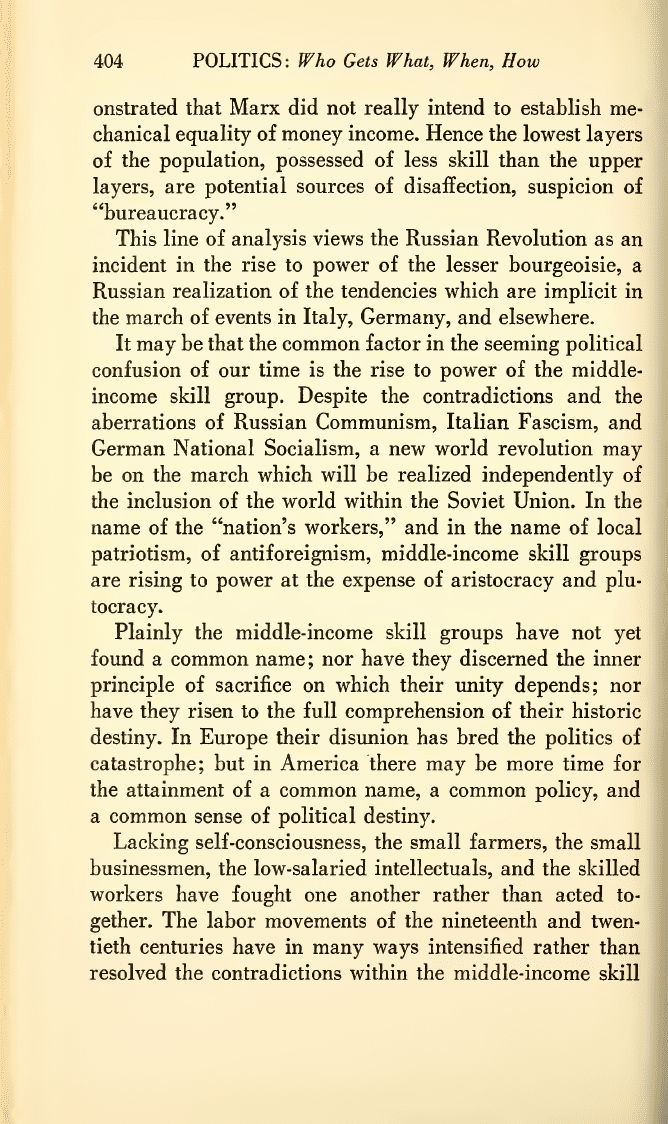
404
POLITICS:
Who Gets What, When,
How
onstrated
that Marx did not really intend
to
establish
me-
chanical
equality
of
money income.
Hence the lowest
layers
of
the
population, possessed
of less
skill
than the upper
layers, are
potential sources of disaffection,
suspicion
of
"bureaucracy."
This line of
analysis views the Russian
Revolution
as an
incident in
the rise
to
power
of the lesser bourgeoisie,
a
Russian
realization of the tendencies which
are
implicit
in
the march
of events in Italy, Germany,
and
elsewhere.
It may be
that the common factor in the seeming political
confusion of
our time is the rise to power of
the
middle-
income
skill group. Despite the contradictions and
the
aberrations
of
Russian Communism, Italian Fascism,
and
German
National Socialism, a new world revolution
may
be on
the march which will be
realized
independently
of
the
inclusion of the world within the Soviet Union. In the
name of the
"nation's workers,"
and in the name of
local
patriotism, of antiforeignism, middle-income skill groups
are rising to power at the expense of aristocracy and plu-
tocracy.
Plainly the middle-income
skill
groups have not
yet
found a common name; nor have they discerned the inner
principle
of sacrifice on
which
their unity depends; nor
have
they
risen
to the
full comprehension
of their historic
destiny.
In
Europe their disunion
has bred the politics
of
catastrophe; but in America there may be more
time for
the attainment of
a
common name,
a
common
policy, and
a common sense of political destiny.
Lacking
self-consciousness, the small farmers,
the small
businessmen,
the low-salaried
intellectuals,
and the skilled
workers have
fought one
another rather
than acted
to-
gether.
The labor movements
of
the nineteenth
and twen-
tieth centuries
have in many ways
intensified
rather
than
resolved the contradictions within the middle-income
skill
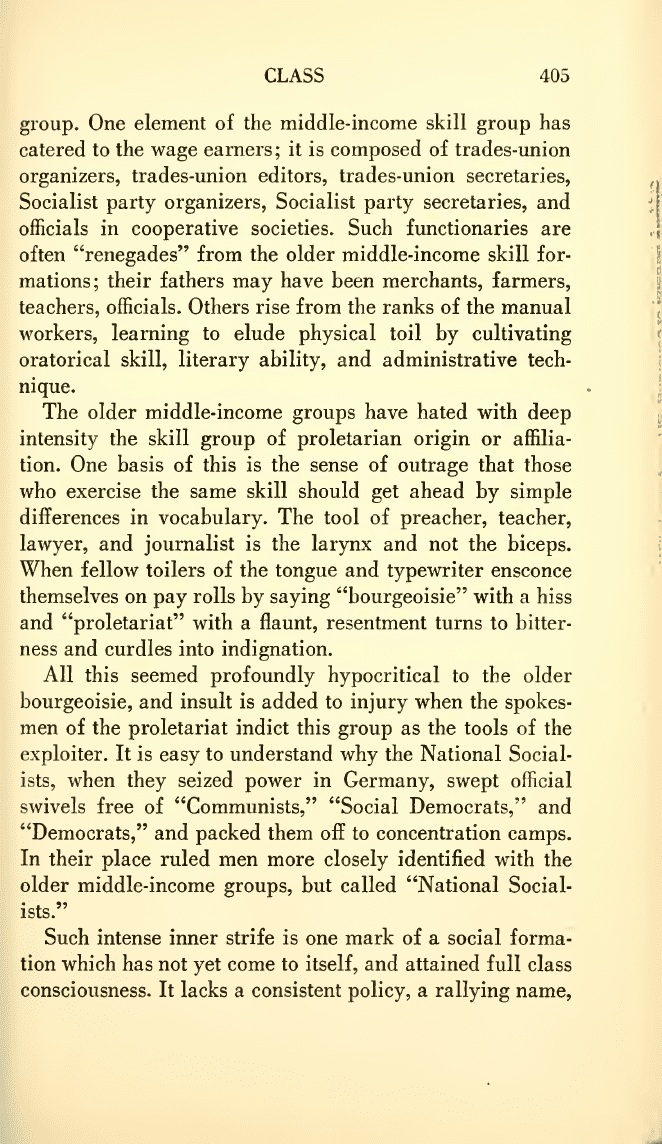
CLASS 405
group. One
element of the middle-income
skill
group has
catered to
the wage
earners;
it is
composed
of trades-union
organizers, trades-union editors,
trades-union
secretaries,
Socialist
party organizers. Socialist party secretaries,
and
officials in cooperative societies. Such functionaries
are
often
"renegades" from
the
older middle-income skill
for-
mations; their fathers
may have been
merchants,
farmers,
teachers,
officials.
Others
rise from the ranks
of the manual
workers, learning to elude physical toil
by cultivating
oratorical
skill, literary ability, and
administrative tech-
nique.
The
older middle-income groups
have hated with deep
intensity the
skill
group of
proletarian origin
or
affilia-
tion. One basis of this is the sense of outrage that those
who exercise the
same skill
should get ahead
by
simple
differences
in vocabulary. The tool of
preacher,
teacher,
lawyer,
and journalist is the larynx and not
the
biceps.
When fellow toilers of the tongue and typewriter
ensconce
themselves on
pay
rolls by saying "bourgeoisie" with
a hiss
and "proletariat" with
a
flaunt, resentment turns
to
bitter-
ness and curdles into indignation.
All
this seemed profoundly hypocritical
to the older
bourgeoisie, and insult is added to injury
when the spokes-
men
of the proletariat indict this group
as
the
tools of the
exploiter.
It
is
easy to understand why the
National Social-
ists,
when they seized power in Germany,
swept
official
swivels
free
of
"Communists," "Social Democrats,"
and
"Democrats,"
and packed them off
to
concentration
camps.
In their
place ruled men more closely identified with
the
older
middle-income groups, but called "National
Social-
ists."
Such
intense
inner strife
is one
mark
of a social forma-
tion which has not yet come to itself, and attained
full class
consciousness. It lacks
a
consistent policy,
a
rallying
name,
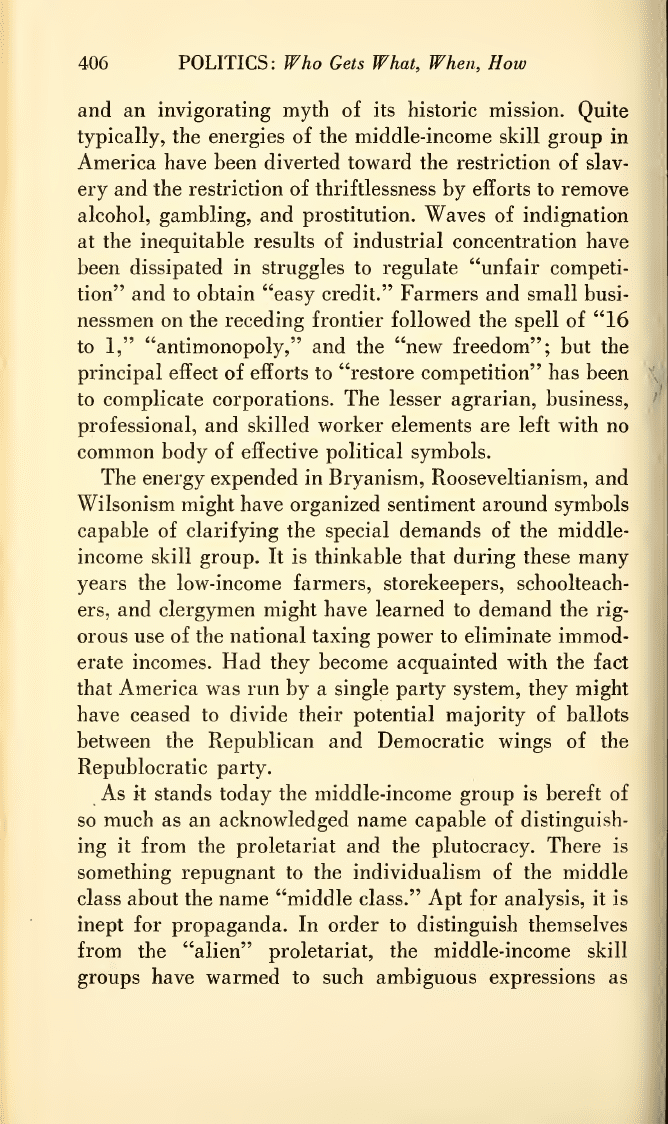
406
POLITICS: Who Gets What, When, How
and an invigorating myth of its historic mission.
Quite
typically,
the
energies
of the middle-income skill group
in
America have been
diverted
toward the restriction
of slav-
ery and the
restriction
of
thriftlessness
by
efforts
to remove
alcohol, gambling, and
prostitution.
Waves of indignation
at the inequitable
results of industrial concentration
have
been dissipated
in struggles
to
regulate "unfair
competi-
tion" and
to obtain "easy
credit." Farmers and
small busi-
nessmen
on the
receding frontier
followed the spell of
"16
to
1,"
"antimonopoly," and
the "new freedom"; but the
principal effect of
efforts
to
"restore
competition" has been
to complicate corporations. The lesser
agrarian,
business,
professional, and skilled
worker
elements are
left with
no
common
body
of effective political symbols.
The energy expended in Bryanism, Rooseveltianism,
and
Wilsonism might have organized sentiment around
symbols
capable of
clarifying the special demands
of the
middle-
income skill group.
It is
thinkable
that during these many
years
the low-income farmers, storekeepers, schoolteach-
ers, and clergymen might have learned to demand the rig-
orous use of the national taxing power to eliminate immod-
erate incomes. Had they become acquainted with the
fact
that America was run by
a
single party system, they might
have ceased to divide their potential majority of ballots
between the Republican and Democratic wings
of
the
Republocratic party.
As it stands today the middle-income group is bereft of
so
much as an acknowledged name capable of distinguish-
ing it from the proletariat and the plutocracy. There is
something repugnant to the individualism of the middle
class
about the name
"middle
class."
Apt for
analysis, it is
inept
for propaganda. In
order
to
distinguish themselves
from
the "alien"
proletariat, the middle-income skill
groups have warmed to
such
ambiguous expressions as
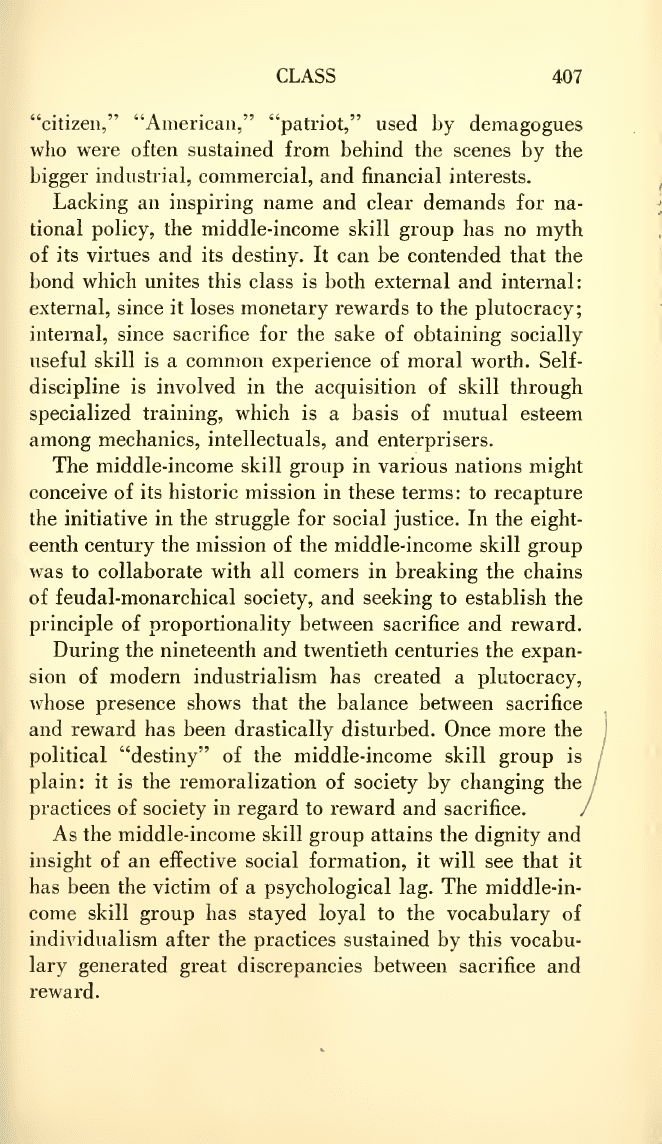
CLASS
407
"citizen,"
"American,"
"patriot,"
used by
demagogues
who
were
often sustained
from behind the scenes
by the
bigger
industrial,
commercial,
and financial interests.
Lacking an inspiring
name and clear demands for
na-
tional
policy, the
middle-income skill group
has no myth
of
its
virtues
and
its
destiny.
It
can be contended that the
bond which unites this class is
both external and internal:
external, since it loses monetary
rewards to
the
plutocracy;
internal, since sacrifice for the sake
of obtaining
socially
useful
skill
is a
common experience
of moral worth.
Self-
discipline
is involved in the acquisition
of
skill
through
specialized training, which is
a
basis
of
mutual
esteem
among mechanics, intellectuals, and enterprisers.
The
middle-income skill group
in various nations might
conceive of its
historic mission
in these terms: to recapture
the
initiative in the
struggle
for social justice. In
the eight-
eenth century the mission of the middle-income
skill group
was
to
collaborate with all comers
in breaking the chains
of feudal-monarchical
society,
and seeking to establish
the
principle
of proportionality
between
sacrifice and
reward.
During
the nineteenth and twentieth centuries
the expan-
sion
of modern
industrialism
has created
a plutocracy,
whose presence shows that the balance between
sacrifice
and
reward has been drastically disturbed.
Once more the
political "destiny" of the middle-income
skill group
is
plain:
it
is
the remoralization
of society by changing
the
y
practices of society in regard to
reward and sacrifice.
/
As the middle-income skill group
attains the dignity and
insight
of an effective social formation,
it
will
see
that it
has
been the victim of
a
psychological
lag. The middle-in-
come skill group has stayed
loyal to
the
vocabulary
of
individualism
after the practices sustained
by this
vocabu-
lary
generated great discrepancies between
sacrifice and
reward.
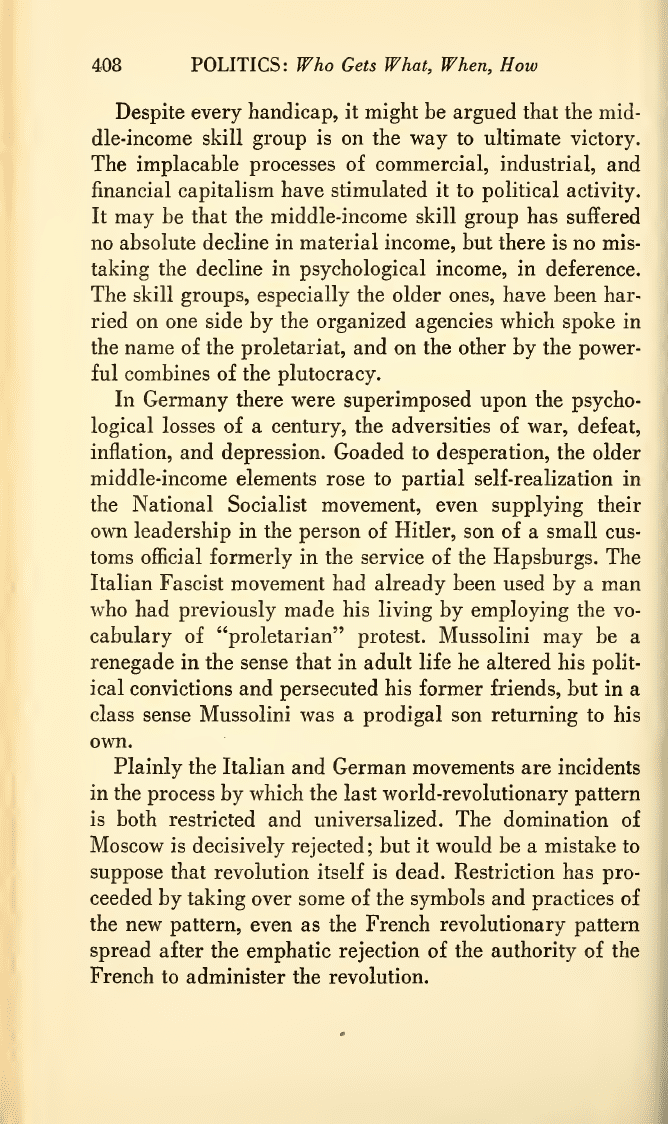
408
POLITICS: Who Gets
What,
When, How
Despite every
handicap, it might be argued that
the mid-
dle-income
skill
group is
on the way to ultimate victory.
The implacable
processes of commercial,
industrial, and
financial capitalism have
stimulated
it to political
activity.
It may be
that the
middle-income skill
group has
suffered
no absolute
decline in material income, but
there is no
mis-
taking the decline in psychological income,
in deference.
The
skill
groups,
especially
the older ones, have
been
har-
ried on one side by the organized agencies which
spoke in
the
name
of the
proletariat,
and on the other
by
the
power-
ful combines
of the
plutocracy.
In Germany there were superimposed
upon the psycho-
logical
losses of a
century,
the
adversities
of war, defeat,
inflation, and depression.
Goaded to
desperation,
the older
middle-income elements rose to partial self-realization
in
the National Socialist movement, even supplying
their
own
leadership
in the person of
Hitler,
son of
a
small
cus-
toms official
formerly in the service of the Hapsburgs. The
Italian Fascist movement
had already been used by
a man
who
had
previously
made
his living
by employing the
vo-
cabulary
of
"proletarian"
protest. Mussolini may be
a
renegade
in the sense that in adult life he altered his polit-
ical convictions
and persecuted
his
former
friends,
but in a
class
sense
Mussolini
was a
prodigal
son
returning
to
his
own.
Plainly
the Italian
and
German movements
are incidents
in the
process by which the last world-revolutionary pattern
is both
restricted and universalized. The domination
of
Moscow
is decisively rejected ; but it
would
be a
mistake
to
suppose that
revolution
itself
is
dead. Restriction
has pro-
ceeded by taking
over
some of the symbols and practices
of
the
new pattern,
even as the
French
revolutionary
pattern
spread
after the emphatic rejection of the
authority
of the
French
to
administer the
revolution.
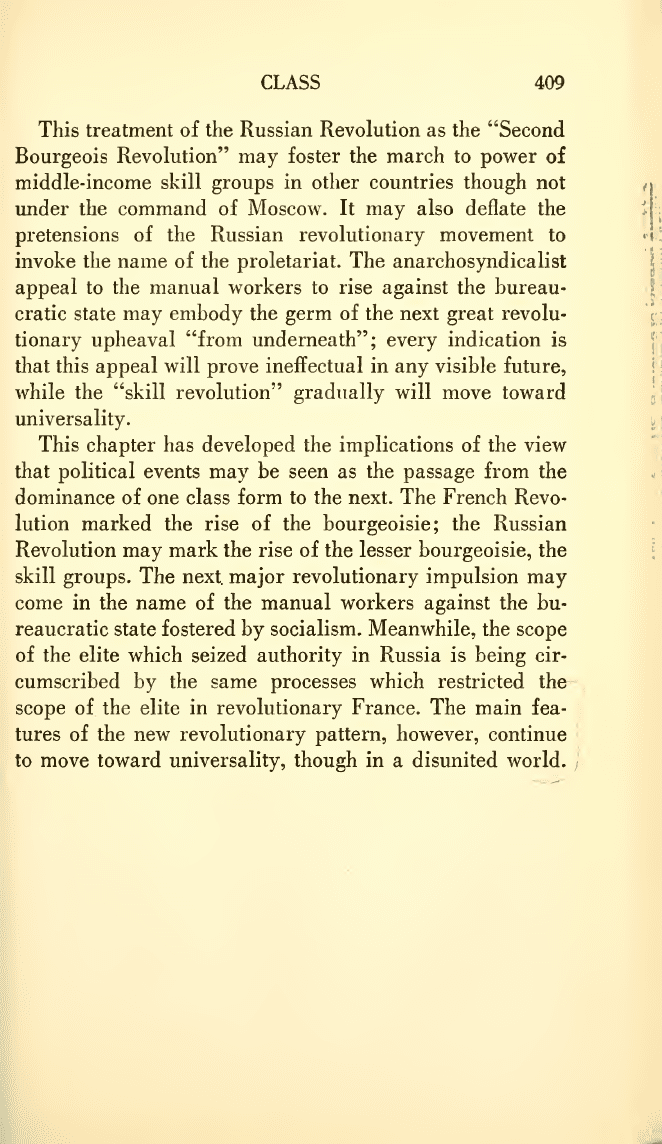
CLASS
409
This treatment
of the Russian Revolution as the
"Second
Bourgeois Revohition" may foster the
march
to power
of
middle-income
skill
groups in
other countries though
not
imder the
command of Moscow. It may also deflate
the
pretensions of the Russian revolutionary movement
to
invoke the name of the proletariat. The anarchosyndicalist
appeal to the manual workers to rise against the bureau-
cratic state may embody the germ of the next great revolu-
tionary upheaval "from underneath"; every indication
is
that this appeal will prove
ineffectual
in any visible future,
while the "skill revolution"
gradually
will move toward
universality.
This chapter has developed the implications
of
the view
that political events
may be
seen
as
the passage from
the
dominance of one class form to the next. The French
Revo-
lution marked
the rise
of the bourgeoisie; the
Russian
Revolution
may
mark
the rise of the lesser
bourgeoisie,
the
skill
groups. The next major
revolutionary impulsion
may
come
in the name of the
manual workers against
the bu-
reaucratic
state
fostered
by
socialism. Meanwhile,
the scope
of
the elite
which
seized authority in Russia
is being
cir-
cumscribed
by
the
same processes
which restricted
the
scope of the elite in revolutionary France. The
main fea-
tures
of the
new revolutionary pattern, however,
continue
to move toward universality, though
in a
disunited
world.
^
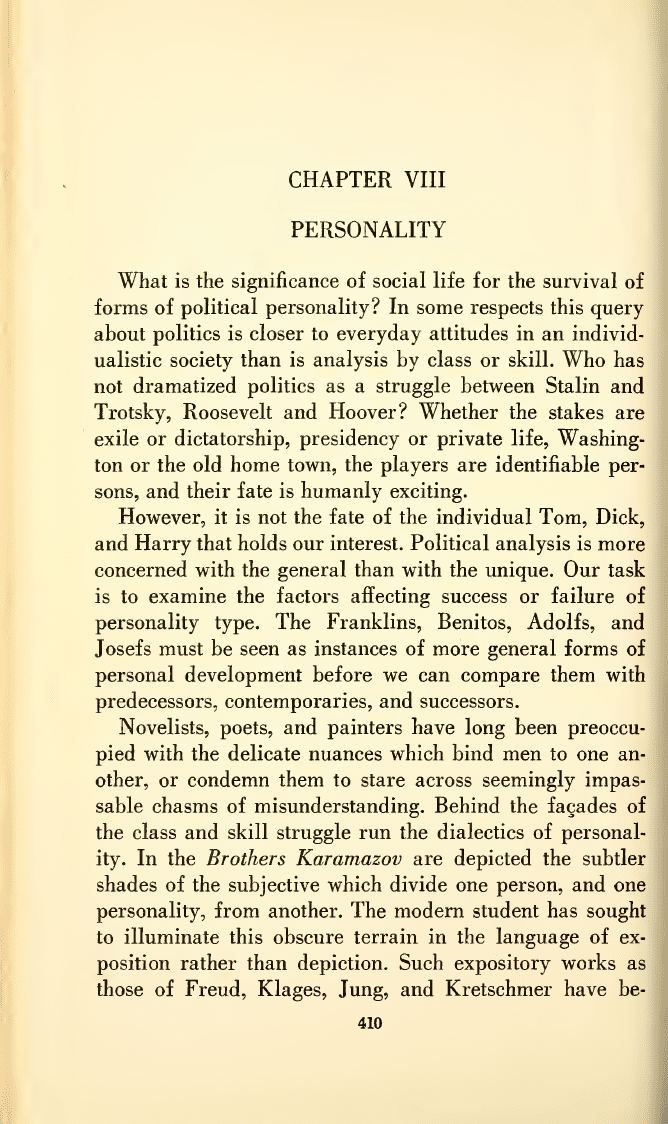
CHAPTER VIII
PERSONALITY
What is the
significance of social life for the
survival
of
forms of
political
personality? In
some respects this
query
about
politics is
closer
to
everyday attitudes
in an
individ-
ualistic
society than is
analysis
by
class
or skill.
Who has
not
dramatized
politics
as a
struggle
between Stalin
and
Trotsky, Roosevelt and
Hoover?
Whether the stakes
are
exile or dictatorship,
presidency
or private life,
Washing-
ton
or the old home
town, the players
are identifiable
per-
sons, and their
fate
is
humanly exciting.
However, it is not
the fate
of
the individual
Tom, Dick,
and
Harry that holds
our
interest. Political analysis
is
more
concerned with the
general than with
the unique. Our
task
is to
examine the
factors affecting
success or failure
of
personality type. The
Franklins,
Benitos,
Adolfs, and
Josefs
must be seen as
instances
of more
general
forms
of
personal development
before
we can compare them with
predecessors, contemporaries,
and
successors.
Novelists,
poets,
and painters
have long been preoccu-
pied with the delicate nuances which bind men
to one an-
other,
or
condemn them to stare across seemingly impas-
sable chasms
of
misunderstanding. Behind the
facades
of
the class and skill struggle run the
dialectics
of personal-
ity. In the
Brothers Karamazov are depicted
the
subtler
shades of the
subjective which divide
one
person, and one
personality, from another. The modem student has sought
to illuminate this obscure
terrain
in
the language
of
ex-
position
rather than
depiction. Such expository works
as
those
of
Freud, Klages,
Jung,
and
Kretschmer
have be-
410
